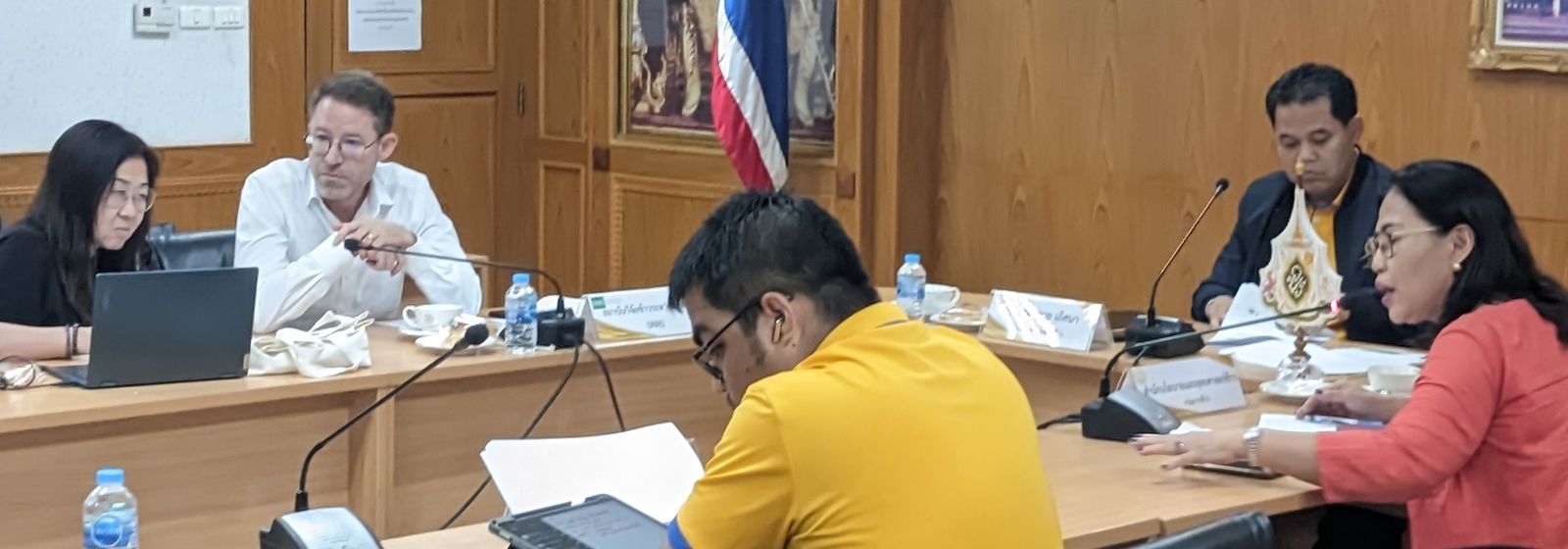Thailand Moves Forward on Low-Emission Rice: IRRI and Ministry Advance Thai Rice Project with GCF Support

On 29 May 2025, the International Rice Research Institute (IRRI) Thailand held a follow-up meeting with representatives from Thailand’s Rice Department under the Ministry of Agriculture and Cooperatives on the next phase of the country’s work plan that was jointly elaborated previously in February 2025. Led by Mr. Sommai Lertna, Acting Rice Production Technology Specialist, and Dr. Orathai Jaituy, Director of the Foreign Relations and Special Projects Group at the Bureau of Rice Policy and Strategy, the meeting was conjoined by GIZ Thailand (Deutsche Gesellschaft für International Zusammenarbeit GmbH). The reunion marked the continuation of joint efforts among the partners toward transforming Thailand’s rice production system.
Two years since the signing of the joint work plan, IRRI and the Rice Department have engaged in sustained collaboration to advance this nationally significant initiative. Funded by the Green Climate Fund (GCF), the project Thai Rice: Strengthening Climate-Smart Rice Farming (Thai Rice GCF) is designed to transform the country’s rice sector through circular economy solutions and climate-smart practices. Globally, rice production contributes greenhouse gas (GHG) emissions on par with the aviation sector, making the need for sustainable solutions in rice farming both urgent and impactful. The project aims to reduce methane emissions through irrigation and straw management while enhancing climate resilience and financial sustainability for Thai rice farmers and service providers. It includes promoting technologies and practices such as rice straw recycling to create value-added products and new market opportunities—offering alternatives to traditional practices like open-field burning.
The current discussions have focused on defining specific priorities and operational steps for each participating stakeholder. IRRI is leading several key components of the project, including:
- Direct Seeded Rice (DSR) systems, which involve mechanization through large-scale rice planters;
Drone technology for water level tracking and Monitoring, Reporting, and Verification
(MRV); - A “Farmer-to-Service Provider” digital platform, connecting farmers to essential services such as harvesting, seeding, and rice residue management—particularly to encourage abandoning straw burning;
- The national MRV system expansion by integrating field-level surveys (focused on Alternate Wetting and Drying) with remote sensing data from drones and satellites to support GHG monitoring.
Looking ahead, the project seeks to contribute to Thailand’s national GHG inventory and NDC (Nationally Determined Contributions) planning processes. IRRI is offering the RiceMoRe tool—a digital solution that streamlines farm-level data collection and automates reporting to provincial and national levels. Developed in collaboration with the government of Viet Nam, RiceMoRe has demonstrated its effectiveness in simplifying data gathering and statistical reporting relevant to rice straw and water management.
As an immediate next step, the partners are formalizing the operational approach for gathering essential data on water use and rice straw practices. This will ensure the project contributes meaningfully to national climate commitments while empowering Thai farmers with the tools and knowledge for sustainable, low-emission agriculture.
#ThaiRiceGCF #RiceScience #DataForDevelopment #ClimateAction
Contact

Bjoern Ole Sander
Country Representative - Thailand and Senior Scientist for Climate Change